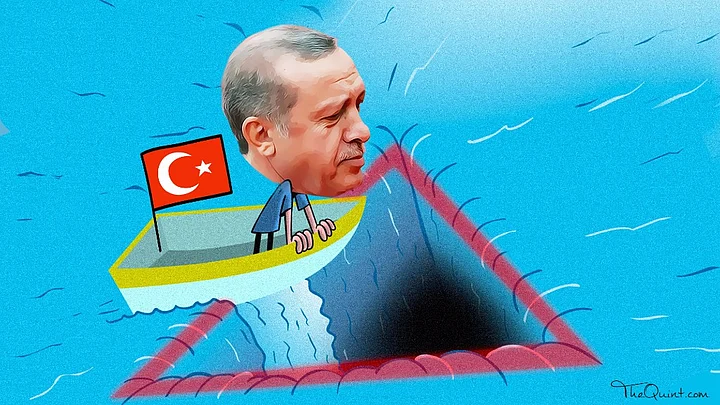The just-concluded state visit of Turkish President Recep Tayyip Erdogan to India (30 April-1 May) has been a diplomatic disaster for India, with the foreign dignitary touching a raw nerve on at least two counts, and the Narendra Modi government doing precious little about it. This setback notwithstanding, India can still turn the tables on Pakistan and wean Turkey away from it.
Erdogan Utters the K-Word
Even before Erdogan set his foot in India, he riled the country in a conscious and deliberate manner. He proposed multilateral negotiations on the Kashmir issue – a big no-no for India – and batted for India’s entry into the Nuclear Suppliers Group (NSG), while also endorsing Pakistan’s membership bid.
Of course, the Indian side countered Erdogan vociferously and put across its own, oft-repeated stance, but the damage was done.
Here was a foreign dignitary on a state visit, representing a country which is a NATO member and an aspirant for the European Union (EU) membership, who spoke like the Prime Minister of Pakistan just ahead of his visit to India.
Clearly, the Ministry of External Affairs was out of their depth and had failed to prevent such an incendiary interview by Erdogan to an Indian TV news channel. The MEA could have pushed the envelope and made Erdogan issue an India-friendly ‘clarification’ – but that didn't happen either.
But never mind. Not all is lost yet. India can still continue to keep working on its Turkey Mission as there are enough fault lines in the so-called strategic relationship between Turkey and Pakistan which can be exploited.
Also Read: Erdogan Suggests ‘Multilateral’ Talks on J&K Ahead of Meeting Modi
Turkey & Pakistan at Loggerheads
Just over two decades ago, India and Turkey used to be on the same page, while Pakistan was in the position of an adversary. During the Afghan Civil War, Turkey was at loggerheads with Pakistan but shared similar strategic interests with India.
The major conflict of interest between Turkey and Pakistan came to the fore when the ISI-backed Taliban was locked in an internecine and bloody struggle for supremacy with the India-backed Northern Alliance.
Turkey supported the Northern Alliance in a big way as the Ahmad Shah Massoud-led outfit comprised a large number of Uzbeks and Turkmens, with whom Turkey shared strong cultural and linguistic ties.
Also Watch: Watch: Why Jamia Students Protested Honorary Doctorate to Erdogan
The Afghanistan Conundrum
Back then, India was comparatively a much weaker power and couldn't elicit strategic and diplomatic capital with Turkey at the expense of Pakistan. After Massoud was assassinated, Pakistan won leverage in Kabul as the Taliban wrested control of much of Afghanistan in 1996 – until it was militarily evicted from power by the US-led offensive in 2001.
Since then, Pakistan has moved quickly to minimise the diplomatic attrition between the two on the issue. Pakistan and Turkey, both Sunni Islamic nations, have already tackled their differences on the Afghanistan conundrum and have been working closely in this diplomatic arena for years.
It’s Not Too Late
Things may look up if the Indian strategic establishment were to play its cards well – provided they have the go-ahead from the political establishment, and some luck to go with it.
There is still an important toehold that India can use to get into the Turkish diplomatic space at the expense of Pakistan.
The Pakistan-Turkey-China triad continues to be the Bermuda’s Triangle for Pakistan-Turkey relations, which can be advantageous for India.
China and the East Turkestan Islamic Movement
Turkey has for long supported the East Turkestan Islamic Movement (or Turkestan Islamic Party) in China. The separatist group, which hopes to establish an East Turkestan in Xinjiang province, has been labelled a terrorist organisation by China and the US.
The movement, which has been as much a red rag for China as Tibet and Taiwan have been, continues to be China's soft underbelly.
Pakistan finds itself in the crosshairs of China and Turkey in this context as it cannot, and does not, support Turkey on the ETIM issue. If it were to come to it, Pakistan’s deep strategic relationship with China holds greater importance than its ties with Turkey.
Moreover, in its quest to please China, Pakistan has routinely conducted security operations against the ETIM and killed not only Uighurs and Uzbeks but also Turks.
This provides India with a huge strategic opportunity. The ETIM factor is a veritable Trojan Horse for India, if only the Indian strategic establishment could play its cards well. That’s why it makes a lot of sense for India to engage with Turkey for now.
(Rajeev Sharma is an independent journalist and strategic affairs analyst who tweets @Kishkindha. This is an opinion piece and the views expressed above are the author’s own. The Quint neither endorses nor is responsible for the same.)
(At The Quint, we question everything. Play an active role in shaping our journalism by becoming a member today.)
